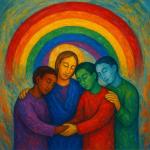By Dr. Chris Seiple
The observation above offered an insight like no other. Frankly, I didn’t believe it when I heard it. It was as strategic and succinct a statement as I have ever heard about America. Religious freedom was not a value but an interest. Religious freedom was not a distant memory of founding mythology—and thus indelible to the American identity domestically; it was practically essential to the expression and extension of that identity abroad. It was an exceptional statement.
The general brand of American “exceptionalism” invoked today tends to leave out the essence of American exceptionalism: religious freedom. Indeed, most citizens and policymakers probably do not directly or quickly associate religious freedom with exceptionalism at all. More likely, most would summarize exceptionalism by referencing Ronald Reagan’s vision of America as a “shining city on a hill.”
But the image of America as a “shining city on a hill” is neither historically accurate nor particularly exceptional. In fact, the phrase refers to a Massachusetts colony that persecuted those who did not conform to their belief and behavior system, just as they had been persecuted for not conforming to the religious system in England.
This unexceptional example of people privileging their own religious freedom over that of others did, however, shape a man who fervently believed in religious freedom, both as a function of his faith and as a matter of good governance—namely, Roger Williams, who was banished from Massachusetts in 1636 and who founded Rhode Island later that same year. For Williams, religious freedom was not only the right thing to do; it was in the self-interest of both society and state.
Read the rest here















